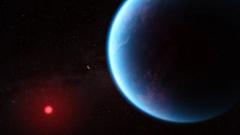In recent weeks, the scientific community has been buzzing with excitement over the detection of certain gases on an exoplanet, K2-18b, which on Earth is associated with life forms. With advancements in technology and deep-space exploration, scientists believe we may soon discover whether we are alone in the universe or not.
Leading the pack is Professor Nikku Madhusudhan of the Institute of Astronomy at Cambridge University, who believes the possibility of discovering life forms elsewhere is tantalizingly close. "This is basically as big as it gets in terms of fundamental questions, and we may be on the verge of answering that question," he states. Such revelations could ignite an unprecedented shift in human consciousness and culture, echoing moments from history like the first images of Earth from space.
Historically, tales of extraterrestrial life have been entrenched in myth and imagination, depicted in art, literature, and early science fiction. From initial speculative musings about Martians in the early 20th century to the modern search for evidence beyond our solar system, humanity's quest to identify "the other" reflects our innate curiosity. Recent discoveries highlight that the focus of various space agencies, including NASA, has shifted from primarily studying Mars to a broader exploration of exoplanets.
Since the first exoplanet was confirmed in 1992, astronomers have identified nearly 6,000 more, uncovering diverse environments that may harbor life, especially in what is termed the "Goldilocks Zone," where conditions may support liquid water. Instruments like NASA's James Webb Space Telescope (JWST) have revolutionized our ability to analyze these distant worlds, unveiling new possibilities for finding biosignatures – the tell-tale signs of life.
Looking ahead, ambitious new projects like the Habitable Worlds Observatory aim to enhance our search for alien life further, potentially providing essential insights into atmospheres similar to Earth's. Yet, doubts concerning the nature and existence of life will persist. The debate remains vigorous, as scientists seek to distinguish between biological and abiotic processes that might explain the detected gases.
Exploration in our own solar system continues, with missions to Mars and icy moons of Jupiter and Saturn poised to investigate the conditions necessary for life. Upcoming projects include the ExoMars rover and NASA's Dragonfly mission to Titan.
As researchers develop strategies for exploring potentially habitable environments, the elusive question of whether intelligent life exists elsewhere persists. The journey of understanding life's emergence from simple to complex forms continues as astronomers and biologists strive to identify the unique conditions required for intelligence to develop, bracing a transformative moment in human awareness.
In discussing the implications of such discoveries, experts like Dr. Robert Massey from the Royal Astronomical Society emphasize a psychological evolution. Finding alien life could diminish humanity's perceived uniqueness but promote a greater understanding of our role in the universe, fostering a sense of unity among us.
Ultimately, the search for extraterrestrial life might illuminate not only the cosmos but also our own journey as humans. With researchers expressing optimism about future discoveries, the question remains: How will such breakthroughs impact human society, identity, and our understanding of existence itself?
As new evidence emerges, the hope is that the revelation of life elsewhere will inspire not fear, but connection among all of humanity, leading to a broader worldview where we recognize ourselves as part of a larger cosmic tapestry.
Leading the pack is Professor Nikku Madhusudhan of the Institute of Astronomy at Cambridge University, who believes the possibility of discovering life forms elsewhere is tantalizingly close. "This is basically as big as it gets in terms of fundamental questions, and we may be on the verge of answering that question," he states. Such revelations could ignite an unprecedented shift in human consciousness and culture, echoing moments from history like the first images of Earth from space.
Historically, tales of extraterrestrial life have been entrenched in myth and imagination, depicted in art, literature, and early science fiction. From initial speculative musings about Martians in the early 20th century to the modern search for evidence beyond our solar system, humanity's quest to identify "the other" reflects our innate curiosity. Recent discoveries highlight that the focus of various space agencies, including NASA, has shifted from primarily studying Mars to a broader exploration of exoplanets.
Since the first exoplanet was confirmed in 1992, astronomers have identified nearly 6,000 more, uncovering diverse environments that may harbor life, especially in what is termed the "Goldilocks Zone," where conditions may support liquid water. Instruments like NASA's James Webb Space Telescope (JWST) have revolutionized our ability to analyze these distant worlds, unveiling new possibilities for finding biosignatures – the tell-tale signs of life.
Looking ahead, ambitious new projects like the Habitable Worlds Observatory aim to enhance our search for alien life further, potentially providing essential insights into atmospheres similar to Earth's. Yet, doubts concerning the nature and existence of life will persist. The debate remains vigorous, as scientists seek to distinguish between biological and abiotic processes that might explain the detected gases.
Exploration in our own solar system continues, with missions to Mars and icy moons of Jupiter and Saturn poised to investigate the conditions necessary for life. Upcoming projects include the ExoMars rover and NASA's Dragonfly mission to Titan.
As researchers develop strategies for exploring potentially habitable environments, the elusive question of whether intelligent life exists elsewhere persists. The journey of understanding life's emergence from simple to complex forms continues as astronomers and biologists strive to identify the unique conditions required for intelligence to develop, bracing a transformative moment in human awareness.
In discussing the implications of such discoveries, experts like Dr. Robert Massey from the Royal Astronomical Society emphasize a psychological evolution. Finding alien life could diminish humanity's perceived uniqueness but promote a greater understanding of our role in the universe, fostering a sense of unity among us.
Ultimately, the search for extraterrestrial life might illuminate not only the cosmos but also our own journey as humans. With researchers expressing optimism about future discoveries, the question remains: How will such breakthroughs impact human society, identity, and our understanding of existence itself?
As new evidence emerges, the hope is that the revelation of life elsewhere will inspire not fear, but connection among all of humanity, leading to a broader worldview where we recognize ourselves as part of a larger cosmic tapestry.



















